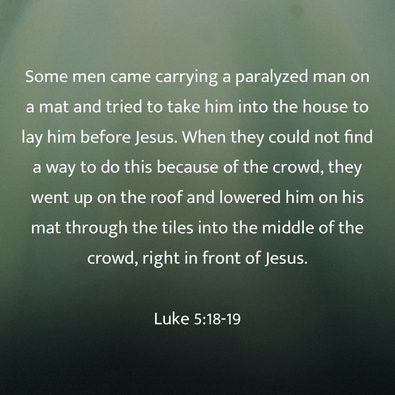|
Good morning!
We're so glad you decided to join us today!
When we meet in person, we share our joys and concerns with each other. If you have prayer requests to share, you can add them to the comments on this post. When you are ready, use this prayer to get started.
Lord, we come to you each day to have communion with you. We come here each week to learn more about you and to worship you with others who also love you. We do it because we have deep longing to know you better, a longing that is satisfied only with the living water of which Jesus spoke. Yet we also know that there are others in our community who share this longing but who do not know how to satisfy it. They try to quench their thirst with other things, but nothing except your presence is enough. Help us to find ways to reach out to these people, without excluding or judging anyone, so that they, too, may find satisfaction for their souls. We pray this in Christ’s name. Amen.
This week's lesson is on John 4:7-15, 28-30, 39-41.
Introduction
People and society put up walls between human beings that have no place in God’s kingdom. We sort people into categories — good and bad, successful and unsuccessful, deserving and undeserving of love and acceptance, people to be welcomed and people to be avoided. Within those categories there are multiple variations. A poor black single mother, for example, would not be in the same category as a wealthy black athlete, recording artist or Supreme Court justice. But categories persist in people’s minds, and people are often sorted out and valued according to our prejudices. It was no different in Jesus’ day. Some of the reasons people were seen as more or less valuable than others were different, but the walls still existed. However, time after time in the gospels, Jesus broke through those barriers and approached each person as an individual trying — and sometimes failing — to live his or her best life. Jesus did not ignore or minimize the weight of people’s sinful choices. Instead, he revealed them and pointed each person to God’s love. Instead of diminishing and discarding people, Jesus offered them a way to peace and forgiveness and a way forward with God. A case in point is our lesson for this morning. It is the story of a Samaritan woman who meets Jesus at a community well in the hottest part of the day. Before our lesson begins, John tells us that Jesus is headed back to Galilee from Jerusalem, where he has just had another encounter. That encounter is with a Pharisee named Nicodemus, a person on a much higher rung on the social ladder than the woman we meet today. After that meeting, the scripture says Jesus had to pass through Samaria. In a spiritual sense that may be true. But on a physical level it is not exactly accurate. Most Jews traveling from Judea to Galilee avoided Samaria altogether by taking the extra time to travel one of two circuitous routes, thus avoiding potential contact with the despised Samaritans. That route set up an encounter that crossed multiple societal barriers. Jesus’s interaction with the Samaritan woman shows us how God does not judge people based on people’s sex, race or nationality or anything else. With God there is only one category — those whom God loves.
The Stranger (verse 7-15)
According to John, it’s the sixth hour when Jesus comes to Jacob’s well. That is an important detail because the sixth hour is noon. It’s a desert community, and no one would normally be at the well at that time of day. Fetching water was women’s work, and that heavy task would be reserved for the cooler parts of the day. Women used this as an opportunity to talk to one another and have some needed social interaction during their daily chores. Instead, Jesus finds a lone woman at the well. She is likely by herself because that is the time when she will not have to encounter any other women. Soon we will learn why she is an outcast and that she would rather endure the heat and isolation than the derision of the other women. In verses 16 to 27 (not in our lesson), we learn that she has had five husbands and is now living with a man who is not her husband. Jesus knows this without being told, and the woman therefore believes he is a prophet. Jesus is also alone because his disciples have gone into the town to buy food. Shockingly, despite all of the obstacles and class differences, Jesus speaks to the woman and asks her for a drink of water. In the ancient Roman world, women were seen as less valuable than men, and therefore men did not normally address women in public. But Jesus is a Jewish man, an important religious figure, and he is speaking not only to a woman but to a Samaritan woman. Samaritans were descendants of the people who belonged to the northern tribes of Israel, but they were also descended from a mixture of other non-Jewish races. In 722 BC, the Assyrian army had invaded the northern kingdom of Israel and taken most of the people back as captives. Those remaining had intermixed with foreigners who had settled in the region. Across the years, they maintained a religion that included many Jewish facets interwoven with other beliefs. They revered only the first five books of the Bible, for example, and they believed God should be worshipped on Mount Gerizim in Samaria instead of in Jerusalem. For this reason, the Jews of the tribes of the southern kingdom of Judea considered the Samaritans tainted in their religion and as a people. Jesus uses his request for water and the Samaritan woman’s response as an opportunity to speak to her about deeper matters. She asks how he, a Jew, could be asking her, a Samaritan, for water. Instead of addressing why he is speaking to her at all, Jesus speaks metaphorically about water and how he has a different kind of “water” that refreshes the soul and that never runs out. He says he can offer that water to her. Like many in John’s gospel, the woman does not understand what Jesus is talking about. She is thinking only on a physical level, but Jesus is talking about a restored relationship with God through the Holy Spirit that meets her deeper spiritual needs. Still, the woman wants this water, if only to relieve her day-to-day physical problems.
The Promised One (verses 28-30, 39-41)
The woman has just said that the Messiah is to come, and Jesus has responded by saying “I am he.” It’s one of the many “I am” statements in this gospel, linking Jesus with the God whom Moses encountered in the burning bush. In that encounter in Exodus 3, God told Moses to tell people who ask who has sent him that “I Am That I Am” has sent him. In this case, Jesus is linking himself with that same God and saying that he is the Messiah to whom the woman refers. With that, the woman leaves in such a rush that she doesn’t bother to take her water jar. Dropping her shame for the sake of urgency, she goes into the town and tells the people to come and see this man who knows all about her life. She raises the question, “Could this be the Messiah?” Even though the woman may not have been considered the best witness, the people respond to her testimony about Jesus and followed her back to the well to decide for themselves. John tells us that many believed after meeting Jesus. The story ends with the Samaritans asking Jesus to stay with them. And in a significant breach of social norms, Jesus stays with them for two days, and during that time many more people come to believe. So the story begins with Jesus coming as an outsider and speaking to a person who is an outsider within her own community. It ends with Jesus staying in a community of people that Jews would not even communicate with. It ends with acceptance and with a restoration of relationships with God and with each other. From this story it is clear that Jesus accepts us as we are, that Jesus overcomes our sinfulness and forgives our sin, and that Jesus breaks down walls and builds community. Wouldn’t it be wonderful if everyone who professes Christ would accept others the same way?
Conclusion
Jesus’ earthly ministry did not include limits based on typical human barriers. His encounter with the Samaritan woman is a prime example. In Jesus’ presence, many of the boundaries that we have put up or that others have put up around us disappear (Romans 3:22; 10:12; Galatians 3:28-29; Ephesians 2:11-22; contrast 5:11; 1 Timothy 4:7; 2 Timothy 3:1-5; Titus 3:10). As we find our identity in Jesus, we can become the conduit of mercy and grace to those we encounter. The living water Jesus gives us is available now and will continue to well up in us until we reach the age to come. The gift we find in Jesus is not a stagnant thing; it moves us from old to new, death to life, lost to found, enslaved to free; it means we are saved!
Prayer
Father, forgive us for the times when we have allowed barriers to prevent us from inviting others to see you. Help us to see those around us the way that you see them; help us to demonstrate your love and holiness to them. This we pray in Jesus’ name. Amen.
Questions for discussion:
Benediction
Today's benediction is from the New King James Version.
Next week's lesson will be on Mark 5:1-13, 18-20.
0 Comments
Leave a Reply. |
AuthorWe are a small, rural Presbyterian church in southwestern Pennsylvania. Archives
July 2024
Categories
All
|



 RSS Feed
RSS Feed